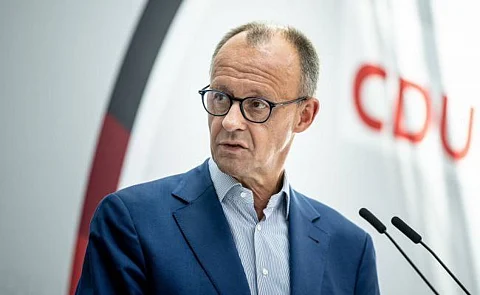

Chinese President Xi Jinping and German Chancellor Friedrich Merz reaffirmed the importance of their countries' relationship in a phone call on Friday, as both nations confront increasing global uncertainty, particularly in the wake of shifting U.S. tariff policies.
The conversation underscored the enduring economic ties between China and Germany, whose bilateral trade reached approximately €246 billion in 2024, according to official data. Both leaders emphasized the need for stable cooperation, with Xi calling for a "new chapter" in the all-encompassing strategic partnership between the two nations.
“China is willing to work with Germany to lead China-EU relations toward new development, and to contribute to the stable growth of the global economy,” Xi was quoted as saying by Chinese state broadcaster CCTV.
A spokesperson for Merz confirmed that both leaders “underlined their readiness to work together as partners” and noted that the German chancellor stressed the importance of “fair competition and reciprocity” in economic ties. Neither side explicitly mentioned the United States, though the backdrop of American tariffs and trade tensions was evident.
Germany has long viewed China as both a crucial economic partner and a strategic competitor. While the Chinese market remains a cornerstone for Germany’s export-driven economy, Berlin has sought to mitigate economic risks through a strategy of “de-risking” — an approach aimed at reducing dependence on Chinese trade without severing ties completely.
Beijing has previously warned Berlin not to use de-risking as a pretext for undermining cooperation. The policy reflects growing concerns across Europe following Russia’s invasion of Ukraine, which prompted reassessments of economic reliance on authoritarian regimes.
Chinese firms have increasingly become rivals to Germany’s manufacturing sector, especially in the automotive industry. In response, Xi urged Germany to ensure a "fair, transparent, and non-discriminatory" business environment for Chinese enterprises. His comments follow several high-profile German decisions to block Chinese investment in sensitive sectors, citing national security concerns — including in semiconductors, satellite technology, and port infrastructure.
The two leaders also discussed the war in Ukraine. Merz reportedly briefed Xi on Europe’s push for a ceasefire and encouraged China to support diplomatic resolutions. While Beijing has maintained a stance of neutrality in the conflict, Western governments have accused it of enabling Russia through trade and diplomatic support.
Recent weeks have seen renewed, albeit fragile, efforts to revive peace negotiations. Talks between Russian and Ukrainian officials in Istanbul marked the first direct engagement in over three years. However, the Kremlin dismissed reports that new talks would take place at the Vatican, stating that no agreement had been reached.
In the broader geopolitical context, both Germany and China are navigating a world marked by what Xi described as “intertwined turmoil and transformation.” Despite diverging political systems and mounting friction, their leaders appear intent on preserving a working relationship rooted in mutual economic benefit and global responsibility.